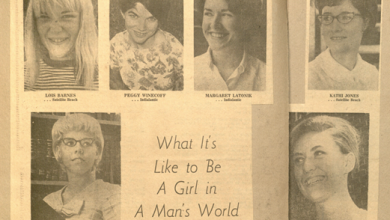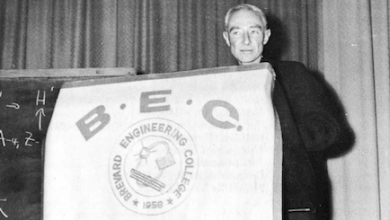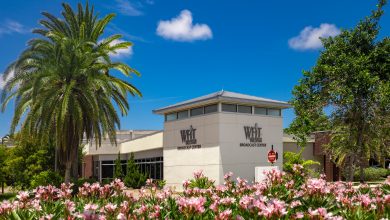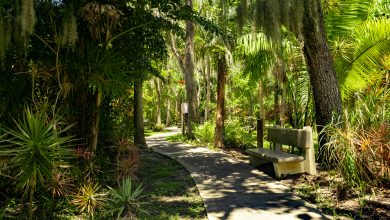Secret History of the Homer R. Denius Student Center
Dateline: 1967

The telegram arrived just before Thanksgiving 1966.
The clipped message from senators Spessard Holland and George Smathers stated, “reservation in college housing loan funds to Florida Institute of Technology in the amount of $500,000 for construction of a student union building.”
The building would include a four-lane bowling alley, a cafeteria, a ballroom and academic and administrative offices.
University president Jerry Keuper told journalists that he wanted the construction to be complete before the beginning of classes in fall 1967.
As always, money proved a challenge. Two years passed before the building’s dedication Feb. 22, 1969. Tom Adams, Florida’s secretary of state, was the principal speaker. The building was named in honor of Homer R. Denius, co-founder of Radiation Inc. and chairman of Florida Tech’s board of trustees.
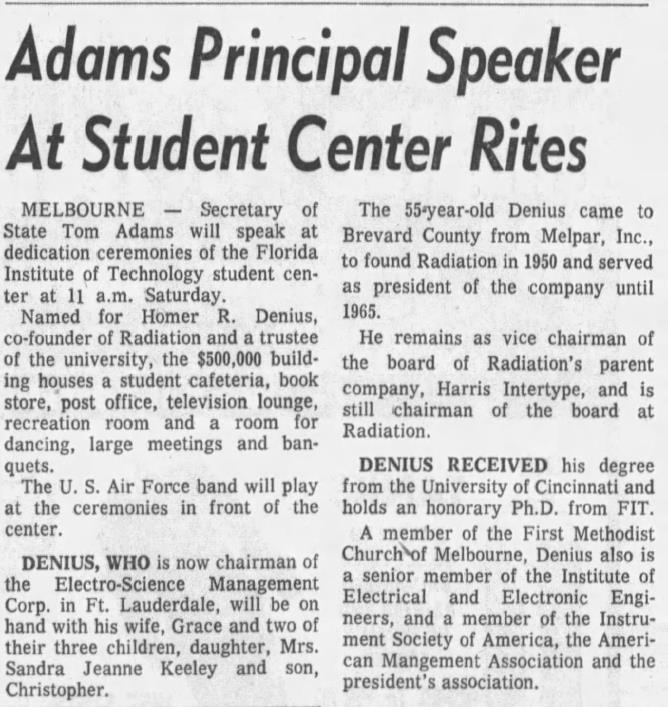
A Fascination with Technology
The man for whom Florida Tech’s student union was named was born in 1914 in Appomattox, Virginia.
As a 10-year-old, Homer Denius built his first radio, and his fascination with technology never abated.
After World War II, with a degree in electrical engineering from the University of Cincinnati, Denius went to work for Melpar Corp. in Alexandria, Virginia.
In 1949, Denius and his friend, George Shaw, made a fateful decision. They gave up their good-paying jobs, sold their Washington homes and decided to move to a sleepy east-central Florida town called Melbourne.
The two men believed that there was a future in government contracts supporting the burgeoning missile test project that was taking shape at Cape Canaveral. In 1950, they co-founded Radiation Inc. Seventeen years later, Radiation Inc. would become Harris Corp., today L3Harris Technologies Inc.
Denius and Shaw threw their support behind Keuper’s idea to launch a science and engineering institute in 1958.
When the Brevard County schools superintendent threatened Brevard Engineering College (BEC), now Florida Tech, with eviction from Eau Gallie Junior High School, Denius was instrumental in finding a temporary home for the fledgling college in the old First Methodist Church building at the intersection of East Strawbridge Avenue and East New Haven Avenue in Melbourne.
The next year, when the church building was razed, Denius and Shaw offered Keuper classroom space in Radiation Inc. Building No. 1.
In 1960, Denius formed the Denius Foundation with the express purpose of supporting BEC. With a handshake and a smile, Denius promised to donate 1,000 shares of Radiation Inc. stock to the college if it could find a permanent home in Melbourne.
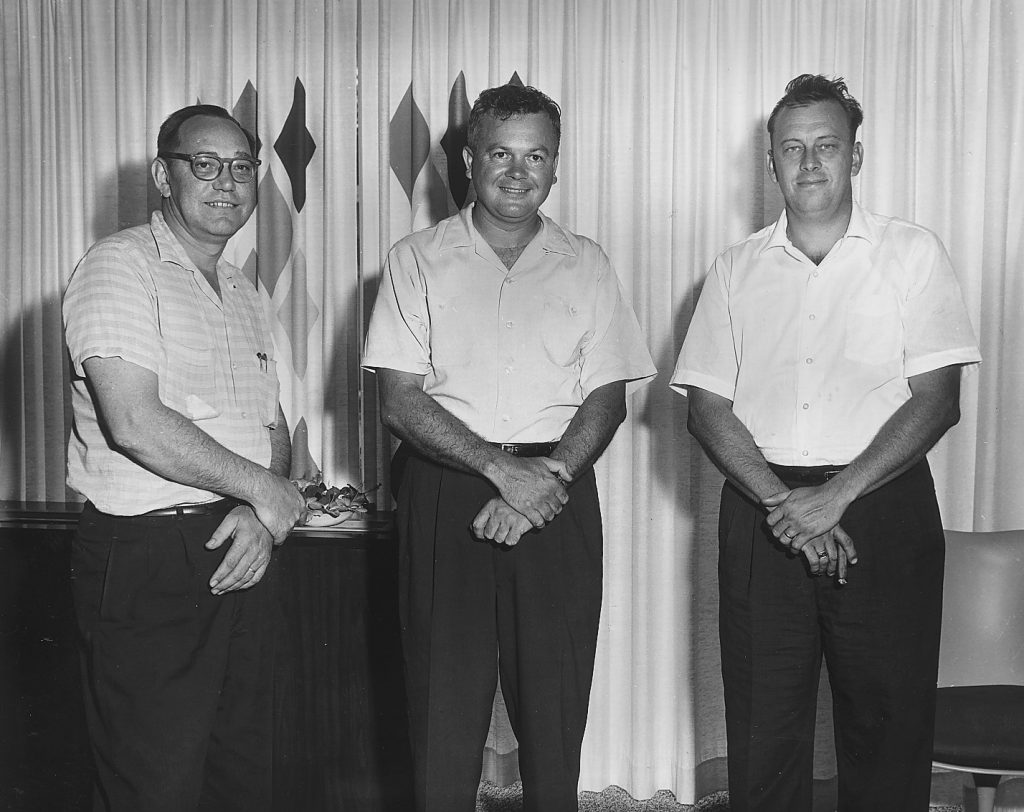
In January 1961, Keuper’s search came to an end with the acquisition of 40-plus acres off Country Club Road in Melbourne. Three months later, Denius honored his commitment and transferred 1,000 shares of stock to the college.
In April 1961, the university broke ground on the John E. Miller Office Building and the first classrooms in what would become the academic quad.
In 1964, BEC awarded Denius and Wernher von Braun, a pioneer in U.S. rocket and space technology, honorary doctorates in space science. That year, the Denius Foundation established a $50,000 matching grant to the college, and two years later, Denius was named chairman of the college’s board of trustees.
Bears, Poets and Engineers
Denius liked students and was pleased that the student union was named in his honor.
Student unions were a relatively recent addition to college campuses at the time. The first student union was established at the University of Pennsylvania in 1896 as a place for students that would be “part clubhouse and part country estate.”
By 1969, student unions had evolved. On many campuses, they had become the rallying point for students protesting the Vietnam War, the center of civil rights campaigns and, often, the focal point for student pranks and mischief.
Denius was a quiet, reserved man with an athletic sense of humor. Perhaps that is one of the reasons that he liked the idea that the student union was named in his honor.
His penchant for making practical jokes was renowned. His most famous lark may well have been inspired by the 19th-century English romantic poet, philander and failed revolutionary, Lord George Gordon Byron.
Lady Caroline Lamb, once Byron’s lover, summed up her impression of her first encounter with a 24-year-old Byron in a single sentence:
“He is mad, bad and dangerous to know.”
A torrid six-month love affair ensued.
It is, however, Byron’s undergraduate years at Trinity College, Cambridge, that provide a tenuous connection to Denius.
Like Denius and generations of Florida Tech students, Byron was an inveterate practical joker. When Byron arrived at Cambridge, he was told that the college’s rules prohibited students from having a dog.
Byron reviewed the university’s regulations. There was no mention of bears among the proscribed pets.
Byron purchased a tame bear named Ursus, and during his three years at Trinity College, the bear accompanied him on campus strolls. Bergen Evans, the American literary scholar, observed that on one occasion, Byron released the bear amid a particularly tiresome professor’s lecture. Ursus cleared the auditorium.
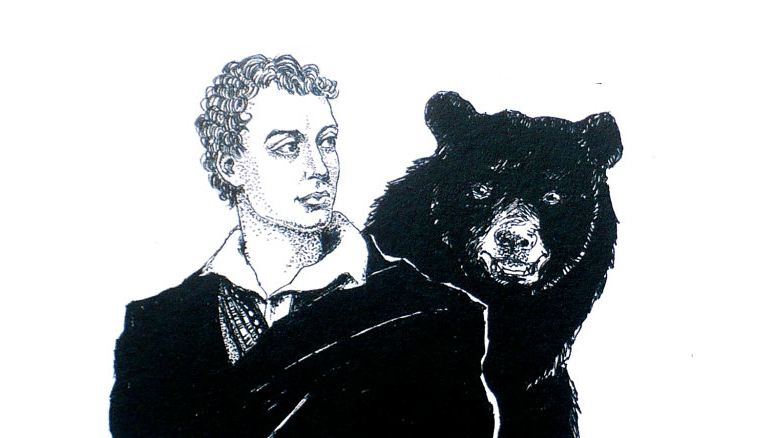
Image Credit: Amazing Things in the World
Bears as Motivational Aids
It is uncertain if Denius knew of the English romantic poet’s pet bear. However, he, too, acquired a tame bear and put it to good use at Radiation Inc.
Denius relayed the story in a Facebook entry shortly before his death.
“We had a sales manager who was afraid of bears,” Denius wrote. “One day, George Shaw and I were in a car headed for the plant, and we came across a hitchhiker on US 1. He had been with a carnival and had a trained bear with him.”
A conversation ensued. Denius and Shaw persuaded the man and the bear to get in their car and come to their offices.
The sales manager was out to lunch. When he returned, the unenthusiastic sales manager found the bear sitting at his desk.
“There was quite a commotion for a while,” Denius said.
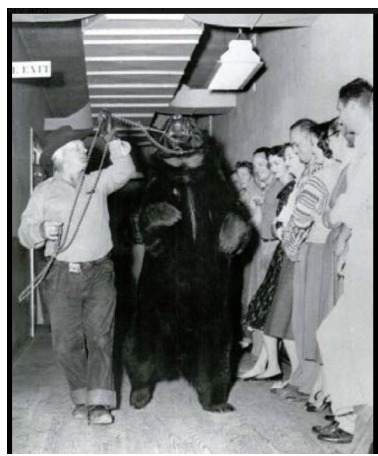
Years later, Florida Tech students unwittingly paid homage to Denius and Byron.
Pi Kappa Alpha (PIKE) fraternity brothers hatched the idea for a prank. In the late 20th century, libraries were much stricter places than they are today.
When Evans Library opened in 1984, its director ordered strict enforcement of the rules governing student behavior. Silence was always to be maintained, and librarians placed signs throughout the building stipulating “No Food,” “No Drinks,” “No Talking,” etc.
One night, shortly before closing, Tori Smith was working at the circulation desk. She heard a scream. More screams and shouts followed.
As a hesitant Smith made her way up the library’s staircase, she heard a strange clucking. She discovered that PIKE fraternity brothers had noted that none of the signs mentioned chickens.
During the evening, they had quietly sneaked a gaggle of chickens into the library and released them. Later, when the dean of students chastised the miscreants, the students, like Byron, pointed out that the library’s regulations did not proscribe chickens.
Equally, like Denius, the students noted that the chickens had proved a motivational tool in emptying the library at closing time.
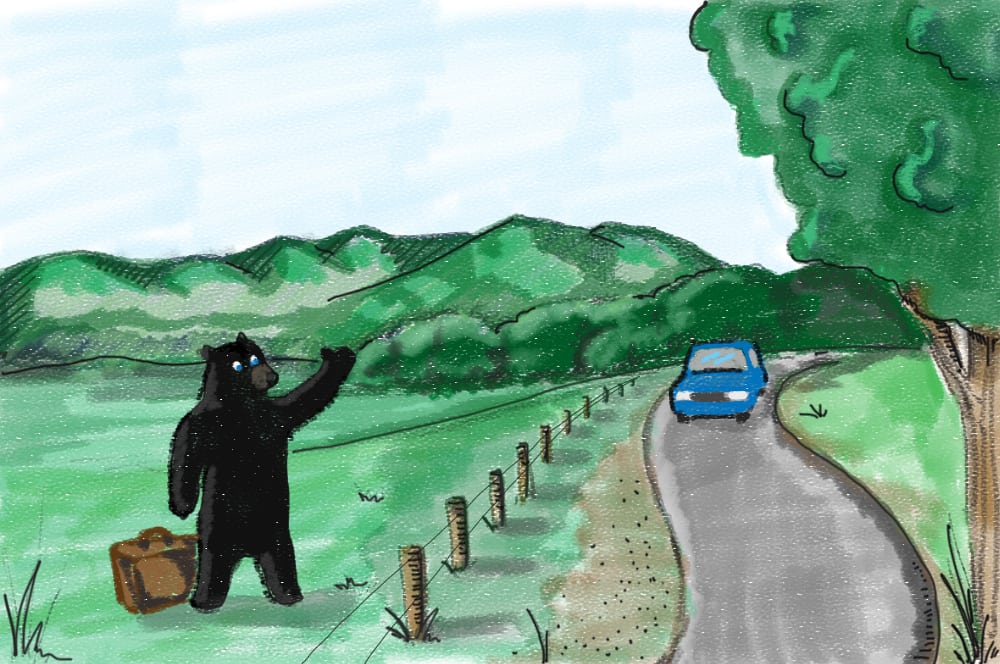
Denius was a true friend of Florida Tech.
In 1994, Lynn E. Weaver awarded him the President’s Medal for his service to the university.
“He was a very genuine guy; nothing phony about him ever,” said Ralph Johnson, Denius’ early colleague at Radiation Inc.
“If he said we will do something, people absolutely believed him. It was very often his word that finally closed a major contract,” Shaw added.
In keeping with that reputation, when Denius promised to support Florida Tech a half-century ago, he kept his word.
Homer R. Denius died in April 2006 at age 92.
Note: No information is extant on what became of the hitchhiker and the bear or PIKE’s chickens.



